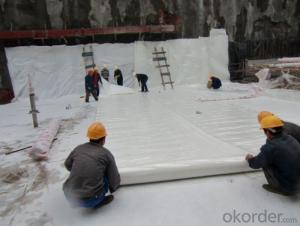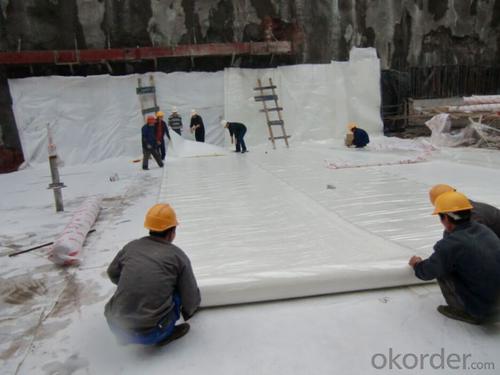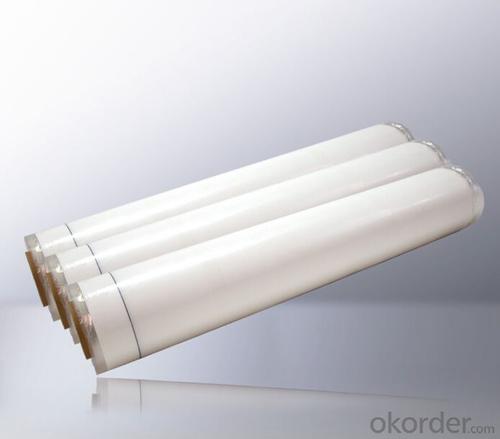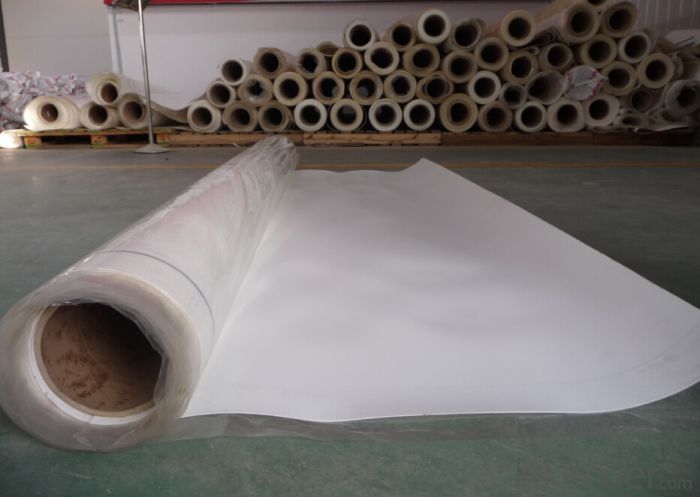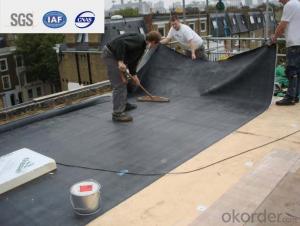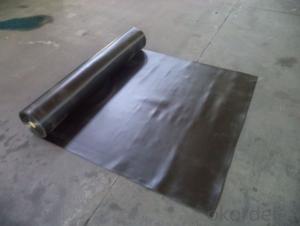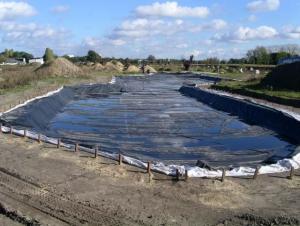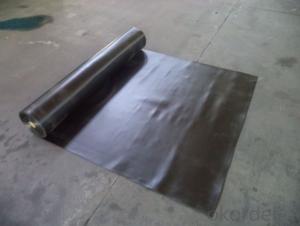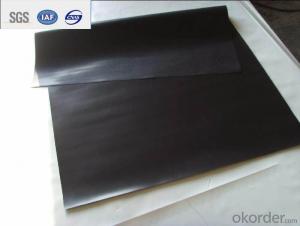HDPE Self-adhesive Waterproof Membrane 1.5mm
- Loading Port:
- Tianjin
- Payment Terms:
- TT or LC
- Min Order Qty:
- 5000 m²
- Supply Capability:
- 100000 m²/month
OKorder Service Pledge
OKorder Financial Service
You Might Also Like
HDPE Waterproof Membrane
High-density Polyethylene (HDPE) Self-adhesive Waterproof Membrane is specially used in underground project, it can bond with concrete layer tightly. After Membrane bonding with concrete, water can be blocked between membrane and concrete, which can improve the reliability.
Product Applications:
Basement,Subway,Tunnel Cave, Other underground public constructions.
Product Advantages:
1. Good bonding with concrete applied on membrane, to block water between membrane and concrete further to protect concrete effectively.
2. Low flatness requirement to substrate, reliable overlapping; mechanical fixing, easy application.
3. Sound anti-puncture performance.
4. Adaptable to settlement and distortion.
5. Weather-resisting and anti-UV.
6. Resist to acid, alkali, mold.
7. Eco-friendly material
Product Specifications:
Width(m) | Length(m) | Thickness(m) |
1.2 or 2.4 | 20 or more | 1.2 or 1.5 |
Test item | Test Method | Unit | Requirement | ||
Water tightness to liquid water | EN 1928 | — | 60KPa,24h,Pass | ||
Resistance to static loading | EN 12730 | Kg | 20 | ||
Tensile force | Longitudinal | EN 12311-2 | N/50mm | ≥800 | |
Transversal | EN 12311-2 | N/50mm | ≥800 | ||
Elongation/ | Longitudinal | EN 12311-2 | % | ≥500 | |
Transversal | EN 12311-2 | % | ≥500 | ||
Durability of water tightness against chemicals | EN 1847 Test afterwards to EN1928 | - | 60KPa,24h,Pass | ||
Durability of water tightness against ageing | EN 1296 Test afterwards to EN1928 | - | 60KPa,24h,Pass | ||
Resistance to impact | EN 12691-B | mm | 600mm | ||
Resistance to tear(Nail Shank)-unreinforced sheets | Longitudinal | EN 12310-1 | N | ≥500 | |
Transversal | EN 12310-1 | N | ≥500 | ||
Peel resistance of joint | EN 12317-2 | N/50mm | ≥400 | ||
Resistance to alkali | EN 1847 Test afterwards to EN1928 | - | 60KPa,24h,Pass | ||
Length | EN 1848 | m | ≥20 | ||
Width | EN 1848 | m | 2.4±0.024/1.2±0.012 | ||
Mass per unit area | EN 1849 | Kg/m2 | ≥1.45(1.5mm); ≥1.15(1.2mm) | ||
Straightness | EN 1848 | mm/10m | ≤20 | ||
Visible defects | EN 1850 | - | No visible defects | ||
Bitumen compatibility | EN 1548 | - | 60KPa,24h,Pass | ||
FAQ:
Q: Can I visit your company?
A: Yes, welcome to visit our enterprise.
Q: Can I do the third party testing before loading?
A: Yes, we could accept the third party testing.
Q: Which kind of payment in your company?
A: We could accept TT, LC at sight, etc.
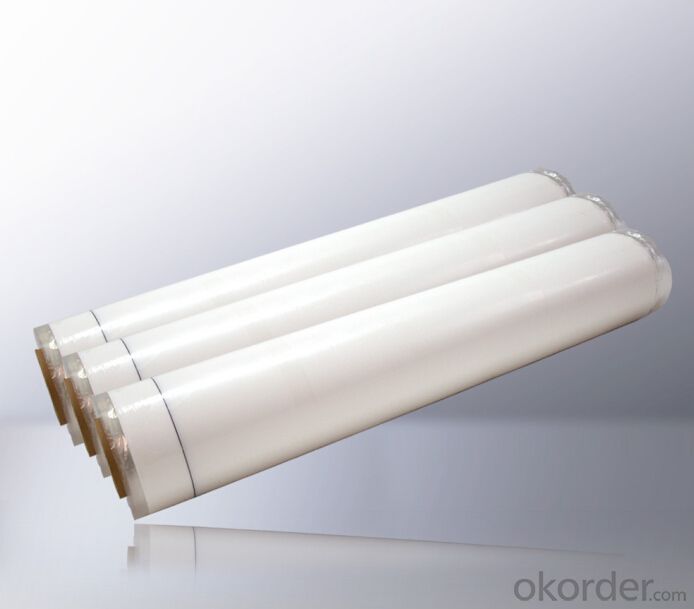
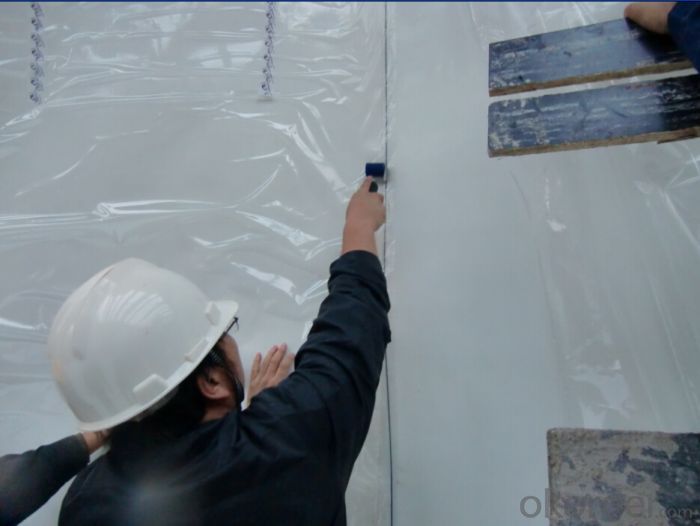
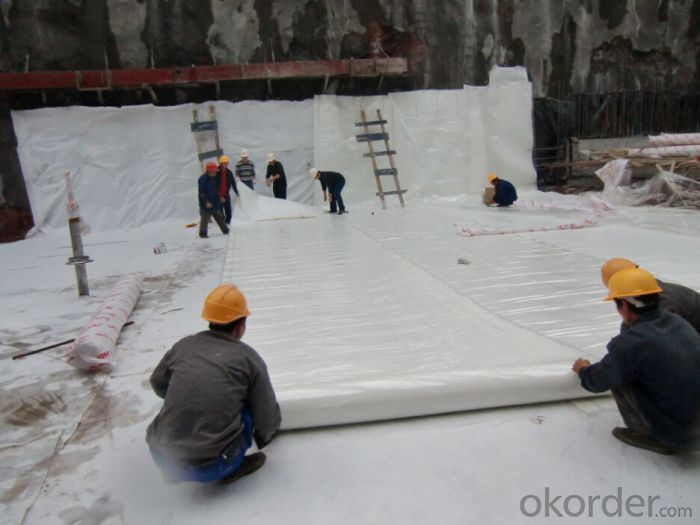
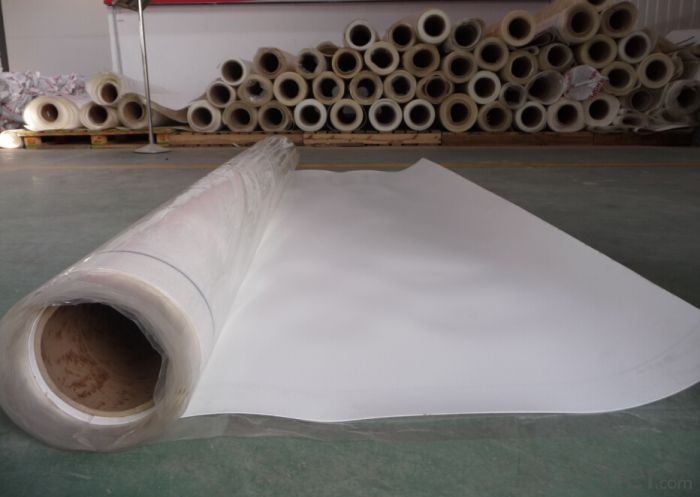
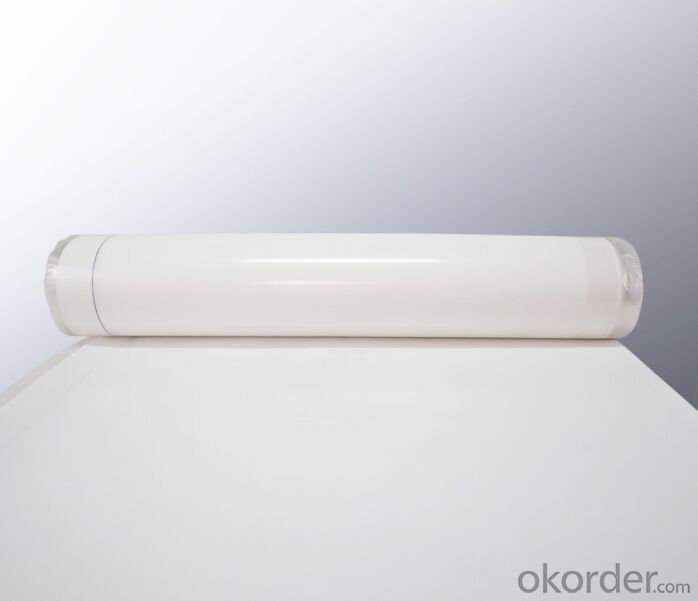
- Q: Can a waterproofing membrane be used for sewage treatment plants and wastewater facilities?
- Yes, a waterproofing membrane can be used for sewage treatment plants and wastewater facilities. These facilities require a high level of protection against water infiltration and leakage, as they deal with large volumes of wastewater and chemicals. A waterproofing membrane can provide a seamless and impermeable barrier to prevent water from entering or exiting the structure, ensuring the integrity of the facility and preventing contamination of surrounding areas. Additionally, a waterproofing membrane can also protect the facility's infrastructure from the corrosive effects of wastewater and chemicals, prolonging its lifespan and reducing maintenance costs. Therefore, utilizing a waterproofing membrane is a crucial component in the construction and maintenance of sewage treatment plants and wastewater facilities.
- Q: Are waterproofing membranes resistant to chemical degradation?
- Yes, waterproofing membranes are generally resistant to chemical degradation. They are designed to withstand exposure to various chemicals, such as acids, alkalis, and solvents, without deteriorating or losing their effectiveness in preventing water penetration. However, the specific resistance to chemical degradation may vary depending on the type and quality of the membrane used.
- Q: Can waterproofing membranes be used on concrete tunnels?
- Yes, waterproofing membranes can be used on concrete tunnels. Waterproofing membranes are commonly used to provide a barrier against water infiltration in various structures, including concrete tunnels. These membranes, which can be made of various materials such as bitumen, PVC, or EPDM, are applied on the exterior surface of the tunnel walls to prevent water from seeping through the concrete. By creating a waterproof layer, these membranes help protect the tunnel from water damage, such as corrosion, deterioration, and leaks. Additionally, waterproofing membranes also provide a protective barrier against other potential sources of moisture, such as groundwater or surface water. It is important to ensure that the selected waterproofing membrane is suitable for the specific conditions and requirements of the concrete tunnel, taking into account factors such as the level of water pressure, chemical exposure, and temperature variations. Proper installation and regular maintenance of the waterproofing membrane are crucial to ensure its effectiveness and long-term durability in protecting the concrete tunnel from water ingress.
- Q: Can a waterproofing membrane be used in boat decks or marinas?
- Yes, a waterproofing membrane can be used in boat decks or marinas. Boat decks and marinas are constantly exposed to water, making them prone to damage and deterioration over time. A waterproofing membrane can provide an effective solution to protect these surfaces from water intrusion, preventing issues such as rotting, warping, and mold growth. The membrane acts as a barrier, preventing water from seeping into the underlying structure and causing damage. It also helps to maintain the structural integrity of the boat deck or marina, prolonging its lifespan. Additionally, a waterproofing membrane can enhance the safety of these surfaces by reducing the risk of slip and fall accidents, as it can provide a slip-resistant surface. Overall, using a waterproofing membrane in boat decks or marinas is a wise choice to ensure their durability, longevity, and safety.
- Q: Can a waterproofing membrane be used on foam block surfaces?
- Yes, a waterproofing membrane can be used on foam block surfaces. The membrane acts as a protective barrier, preventing water penetration and ensuring the foam blocks remain waterproof.
- Q: Can a waterproofing membrane be applied to concrete?
- Yes, a waterproofing membrane can be applied to concrete. It is a common method used to prevent water infiltration and protect the concrete structures from damage caused by moisture.
- Q: Can a waterproofing membrane be used for interior applications?
- Yes, a waterproofing membrane can be used for interior applications. It is commonly used in bathrooms, kitchens, basements, and other areas where moisture or water damage is a concern. The membrane helps prevent water penetration and protects the underlying structure from potential damage.
- Q: Can a waterproofing membrane be used in bathrooms?
- Indeed, bathrooms can benefit greatly from the utilization of a waterproofing membrane. It is strongly advised to employ such a membrane in bathrooms as a preventive measure against water-related harm and leakage. Typically, this membrane is applied to both the walls and floors, establishing a protective barrier that inhibits water infiltration, subsequently averting structural deterioration or the proliferation of mold. This is particularly crucial in areas of heightened water exposure, such as showers and the vicinity of bathtubs. These waterproofing membranes are engineered to endure moisture and offer enduring safeguarding, thereby assuring the soundness of the bathroom and prolonging its longevity.
- Q: Can waterproofing membranes be used on plant rooms?
- Yes, waterproofing membranes can be used on plant rooms. Waterproofing membranes are often used in areas where water resistance is necessary, such as basements, roofs, and plant rooms. Plant rooms typically house various mechanical and electrical equipment, and using waterproofing membranes can help protect these sensitive components from water damage.
- Q: Can a waterproofing membrane be used on stone surfaces?
- Yes, a waterproofing membrane can be used on stone surfaces. Stone surfaces, such as natural or manufactured stone, can benefit from the application of a waterproofing membrane to prevent water penetration and protect against moisture-related issues. Waterproofing membranes are designed to create a barrier against water and other liquids, preventing them from seeping into the stone and causing damage. This can be particularly important for exterior stone surfaces that are exposed to rain, snow, and other weather conditions. Additionally, using a waterproofing membrane on stone surfaces can help prolong the lifespan of the stone by reducing the risk of cracks, spalling, and other forms of deterioration caused by water absorption. It is essential to choose a waterproofing membrane specifically formulated for stone surfaces to ensure proper adhesion and long-lasting protection.
Send your message to us
HDPE Self-adhesive Waterproof Membrane 1.5mm
- Loading Port:
- Tianjin
- Payment Terms:
- TT or LC
- Min Order Qty:
- 5000 m²
- Supply Capability:
- 100000 m²/month
OKorder Service Pledge
OKorder Financial Service
Similar products
Hot products
Hot Searches
Related keywords
